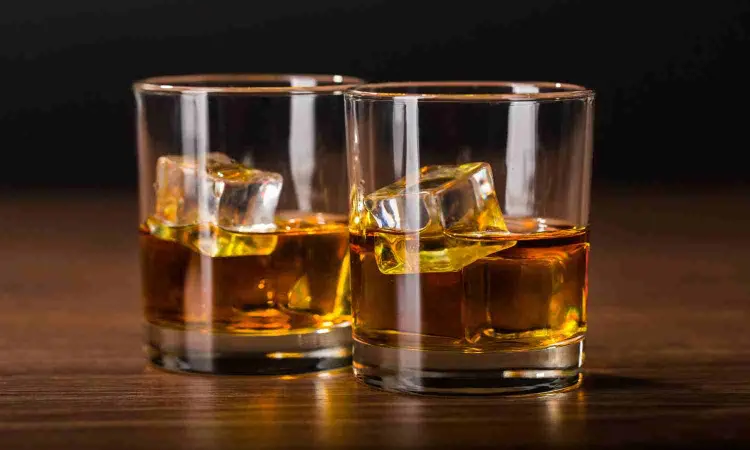- Home
- Medical news & Guidelines
- Anesthesiology
- Cardiology and CTVS
- Critical Care
- Dentistry
- Dermatology
- Diabetes and Endocrinology
- ENT
- Gastroenterology
- Medicine
- Nephrology
- Neurology
- Obstretics-Gynaecology
- Oncology
- Ophthalmology
- Orthopaedics
- Pediatrics-Neonatology
- Psychiatry
- Pulmonology
- Radiology
- Surgery
- Urology
- Laboratory Medicine
- Diet
- Nursing
- Paramedical
- Physiotherapy
- Health news
- Fact Check
- Bone Health Fact Check
- Brain Health Fact Check
- Cancer Related Fact Check
- Child Care Fact Check
- Dental and oral health fact check
- Diabetes and metabolic health fact check
- Diet and Nutrition Fact Check
- Eye and ENT Care Fact Check
- Fitness fact check
- Gut health fact check
- Heart health fact check
- Kidney health fact check
- Medical education fact check
- Men's health fact check
- Respiratory fact check
- Skin and hair care fact check
- Vaccine and Immunization fact check
- Women's health fact check
- AYUSH
- State News
- Andaman and Nicobar Islands
- Andhra Pradesh
- Arunachal Pradesh
- Assam
- Bihar
- Chandigarh
- Chattisgarh
- Dadra and Nagar Haveli
- Daman and Diu
- Delhi
- Goa
- Gujarat
- Haryana
- Himachal Pradesh
- Jammu & Kashmir
- Jharkhand
- Karnataka
- Kerala
- Ladakh
- Lakshadweep
- Madhya Pradesh
- Maharashtra
- Manipur
- Meghalaya
- Mizoram
- Nagaland
- Odisha
- Puducherry
- Punjab
- Rajasthan
- Sikkim
- Tamil Nadu
- Telangana
- Tripura
- Uttar Pradesh
- Uttrakhand
- West Bengal
- Medical Education
- Industry
Alcohol and Inflight Hypoxia Significantly Worsen Sleep and Oxygen Levels, reveals study

Researchers have demonstrated that alcohol consumed during the preparation for sleep in an environment of low pressure such as in an airplane cabin significantly lowers the quality of sleep, promotes elevated heart rate, and prolongs hypoxia time. A recent study was published in the journal Thorax conducted by Trammer and colleagues.
Long-haul flights subject passengers to inadequate oxygen due to a lower pressure in the cabin which can impact sleep. Moreover, alcohol consumption from the list of additives may enhance these effects and lengthen periods characterized by low SpO2 and high heart rates with decreased deep sleep. Low air pressure can decrease the amount of oxygen in blood. It is one of the predominant causes of hypoxia in cabins of flights. This study was conducted to research the combined effect of alcohol consumption and hypobaric hypoxia on sleep patterns, oxygen saturation, and heart rate.
The subjects were two groups of healthy participants followed up during sleep in a normal sleep laboratory or in a hypobaric chamber simulating the reduced air pressure found at an altitude of 2,438 meters (about 8,000 feet). They had a 4-hour sleep opportunity from 00:00 to 04:00 hours and were given alcohol before one of the nights, with a mean blood alcohol concentration of 0.043%. Both nights with and without alcohol were counterbalanced in the order for the groups. The sleep stages were recorded using polysomnography, and oxygen saturation and heart rate were measured all through the night. To ensure a full recovery of participants, two full recovery nights of sleep separated the study conditions.
The study developed a number of important findings on the effects of alcohol and inflight hypoxia on sleep and levels of oxygen:
• Under both conditions combined (alcohol and hypobaric hypoxia), SpO2 fell to a median value during sleep to 85.32% compared to 88.07% without alcohol under the condition of hypobaric hypoxia, whereas in the alcohol-only condition, it was still 94.97%. In the sleep laboratory (ordinary atmospheric pressure), without alcohol, SpO2 reached 95.88 %.
• It increased heart rate to a significant extent in the combined condition with a median of 87.73 bpm as compared with 72.90 bpm in the non-alcohol hypobaric condition, 76.97 bpm in the alcohol condition, and 63.74 bpm in the sleep laboratory without alcohol.
• The time below the clinical threshold of 90% SpO2 median was reached to be 201.18 minutes within the combined condition. For the non-alcohol hypobaric condition, median time below this threshold reached 173.28 minutes. In the sleep laboratory, participants showed no exposure time to the level below 90% SpO2, regardless of alcohol consumption.
• Deep sleep was reduced to 46.50 minutes with the combined condition, as compared to 84.00 minutes while alcohol was used in the sleep laboratory and 67.50 minutes without alcohol.
A combination of alcohol consumption and inflight hypobaric hypoxia severely impairs sleep quality with a further increase in heart rate and prolongs the duration of hypoxemia (SpO2 <90%) in healthy volunteers. It is worth remembering these risks when consuming alcohol for long flights, because the carelessness of alcohol consumption might deteriorate people's overall well-being and recovery while traveling and after arriving at the destination.
Reference:
Trammer, R. A., Rooney, D., Benderoth, S., Wittkowski, M., Wenzel, J., & Elmenhorst, E.-M. (2024). Effects of moderate alcohol consumption and hypobaric hypoxia: implications for passengers’ sleep, oxygen saturation and heart rate on long-haul flights. Thorax, 79(10), 970–978. https://doi.org/10.1136/thorax-2023-220998
Dr Riya Dave has completed dentistry from Gujarat University in 2022. She is a dentist and accomplished medical and scientific writer known for her commitment to bridging the gap between clinical expertise and accessible healthcare information. She has been actively involved in writing blogs related to health and wellness.
Dr Kamal Kant Kohli-MBBS, DTCD- a chest specialist with more than 30 years of practice and a flair for writing clinical articles, Dr Kamal Kant Kohli joined Medical Dialogues as a Chief Editor of Medical News. Besides writing articles, as an editor, he proofreads and verifies all the medical content published on Medical Dialogues including those coming from journals, studies,medical conferences,guidelines etc. Email: drkohli@medicaldialogues.in. Contact no. 011-43720751


